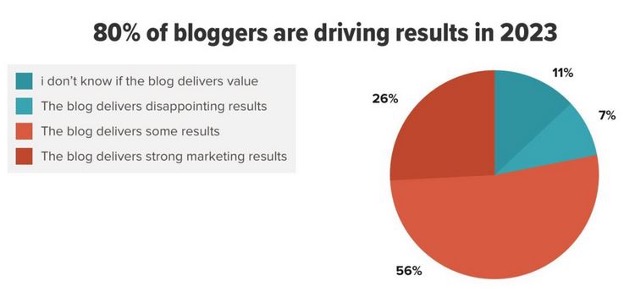In this day and age, the benefits of blogging couldn’t be any more obvious.
Its advantages have been demonstrated countless times, and while there used to be a bit of a debate about whether or not it was worth it to write blogs, that argument has been over for quite some time.
To be fair, I’ve been working in marketing for more than 20 years, so I’m much more aware of the benefits of having a blog, and I’ve seen firsthand the impact blogging can have.
But for whatever reason, a lot of business owners are still willing to discount the benefits of blogging.
Often, it’s because they don’t have the time, or don’t want to make the time, to sit down and do the writing, but even if they get someone else to do it, it’s common for them to have very unrealistic expectations, or just not understand the value of blogging at all.
But regardless of these erroneous ideas, having a blog can offer many benefits for your business, and this is as true now as it was when I got into marketing.
For instance, a report from HubSpot, which surveyed more than 1,200 marketers from around the world, found that blogging is tied with social media shopping tools and influencer marketing for having the highest return on investment of any marketing channel.
Moreover, as you can see from the graph below, in a survey from Orbit Media Studios, which polled 1,000 bloggers, the vast majority of them said that their blogging efforts have driven results in 2023, including things like more leads and website traffic, and greater brand awareness, and one in four respondents said their blog “delivers strong marketing results”.

Studies like this show without a doubt that having a blog can significantly benefit your business, but as is the case with so many business owners, you might still be on the fence.
With that in mind, I want to break down the many benefits of blogging to help you understand why this is such an important practice.
So, if you’re asking, “What is the point of blogging?” or you just want to learn more about the benefits of having a blog, then this is an article you’re not going to want to miss.
Read: Top Tips on Blogging to Keep Your Audience Engaged and Coming Back for More

Blogging offers a long list of benefits for businesses, but coming up with content that’s actually going to engage your audience is easier said than done.
You can’t just write whatever you want and expect your audience to be interested, and consistently coming up with new ideas can be tough.
With that in mind, this article offers eight tips to make your blog more engaging, including updating it frequently and regularly, publishing long-form content, and more.
What Are the Benefits of Blogging?
Despite all the business owners out there who insist on discounting the benefits of blogging, the fact of the matter is having a blog on your website can benefit your marketing efforts in many different ways.
With that in mind, below I’ve listed some of the most important benefits of having a blog, so you can understand just how beneficial it is for your business to have one.
Enhancing Online Visibility Through SEO
One of the most crucial benefits of having a blog for your business is how it can help you to search engine optimize your website. Here’s how blogging can help you improve your search engine rankings:
Search Engine Optimization: Regularly publishing blogs with relevant, keyword-rich content can increase the likelihood of your website ranking higher in search engine results. This enhanced visibility is vital, as higher search engine rankings can significantly increase your business’ exposure to potential customers.
Long-Tail Keywords: Having a blog gives you the opportunity to integrate long-tail keywords into your content, which are highly specific phrases that are less likely to face stiff competition. By targeting these keywords, you can attract more qualified leads who are more likely to make a purchase.
Backlinks: Quality blog content can help you earn backlinks from other reputable websites that have taken the time to link to your content. Backlinks are invaluable for SEO, as they can boost your website’s domain authority, signaling to search engines that your content is valuable and trustworthy, which can further improve your search rankings.
Building Brand Identity and Establishing Authority
If you want to stand out amongst your competitors, you need to be seen as an authority, and you need a unique brand identity. Having a blog can help you accomplish this by allowing you to:
Demonstrate Expertise and Leadership: Through well-researched and insightful blog posts, your business can showcase expertise and knowledge, and this helps you to establish authority and credibility, which are key for building trust with potential customers.
Develop Your Brand Voice: Blogs can allow you to express your brand’s personality and values, helping you to distinguish yourself from competitors. A unique and consistent brand voice can have a significant impact on your target audience, creating a strong emotional connection.
Offer Industry Insights and Trends: Regular blogging about industry trends, insights, and news helps to position your business as a go-to source for valuable information. This not only reinforces your business’ role as an industry leader but also keeps customers engaged and informed.
Engaging and Understanding Your Target Audience
Great content marketing is all about understanding your target audience, and blogging offers a great way to go about doing this. Blogging can help you understand and connect with your audience through:
Direct Engagement: Blogs give you a platform for direct interaction with your audience through comments and feedback. This interaction fosters a sense of community and loyalty, which can help turn readers into loyal brand advocates.
Customer Insights: Analytics from blog interactions provide invaluable data on your customers’ preferences and behaviours, and having a better understanding of which topics resonate with your audience can guide future marketing strategies and content creation, even outside of your blog.
Personalized Content: Blogging gives you the ability to address various segments of your audience with tailored content. This personalization can significantly increase the relevance and effectiveness of your marketing efforts.
Driving Traffic and Lead Generation
Regularly publishing blog posts is one of the best ways to drive traffic to your website and generate high-quality leads. Here’s how blogging can help you to do that:
Consistent Website Traffic: Each blog post represents a new page on your website, which increases the likelihood of it being found on search engines and drawing in traffic. This consistent flow of traffic is vital if you want to consistently generate leads and make sales.
Effective Calls-to-Action: Strategic placement of calls-to-action in blog posts can help you encourage your audience to convert. Whether it’s signing up for a newsletter, downloading a whitepaper, or inquiring about a service, effective calls-to-action can turn passive readers into active leads.
Content Syndication: Blog posts provide shareable content for social media platforms, extending your reach far beyond just your website. Sharing content on social media can also increase your likelihood of earning valuable backlinks, which can further improve your SEO.
Customer Relationship Management
Having a blog for your business is a great way to interact with your audience and build an emotional connection with customers. Blogging on a regular basis can benefit this aspect of your business by:
Building Trust with Educational Content: Providing educational and informative content can help solve customers’ problems and answer their questions, which allows you to build trust and position your brand as an authoritative, helpful resource.
Improving Customer Retention: Engaging and relevant blog content can encourage customers to return to your website, which is crucial for nurturing long-term customer relationships.
Leveraging Feedback and Interaction: Blogs offer a space for customers to provide feedback, ask questions, and interact with your business. This direct line of communication is often overlooked but offers an incredibly effective way to improve products and services and better understand the needs of your customers.
Analytics and Strategy
Blogging also gives you the chance to analyze the types of content your audience likes best and be strategic about what kind of content you decide to publish. Here are some of the ways you can do that:
Using Analytics for Insights: Tools like Google Analytics can track blog performance, offering insights into the behaviour of your website visitors, the popularity of your content, and conversion rates. These metrics are essential for understanding the effectiveness of your blogging efforts.
Optimizing Your Strategy Based on Data: Analyzing blog performance data gives you the chance to refine your business’ content strategy, allowing you to focus on topics and formats that yield the best results. This data-driven approach can help you ensure you’ll see a higher return on investment from your content marketing efforts.
Gaining a Competitive Advantage: When there are so many businesses out there that don’t have blogs, or don’t regularly update them, having a well-executed blogging strategy can provide a substantial competitive edge and help to improve your brand positioning.
Do you want to start a blog but just don’t have the time? Why not book a free 30-minute consultation with me to find out how we can help?
To your business success,
Susan Friesen
P.S. If you liked the article, you might want to subscribe to our newsletter. We publish tons of valuable content to help you learn more about marketing, and subscribing is the best way to ensure you don’t miss out. Additionally, if you’d like to learn more about building a search engine optimized website, click here for our free website guide.







